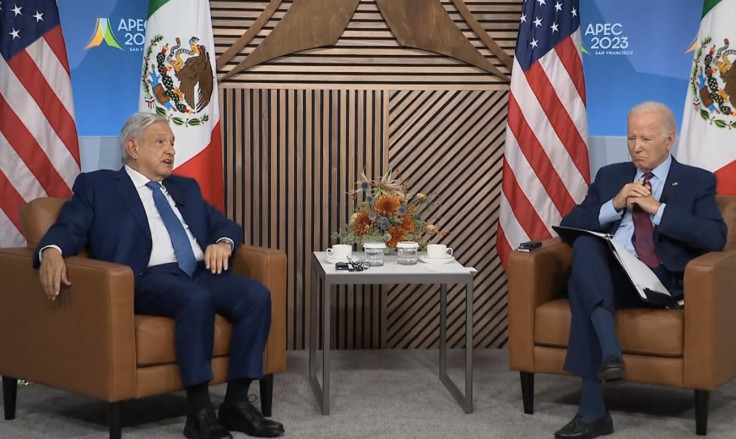
U.S. president Joe Biden urged his Mexican counterpart, Andres Manuel Lopez Obrador (commonly known as AMLO) to step up cooperation to address two issues mostly concentrated in their countries joint border: the fentanyl crisis and migration.
During a bilateral meeting on the sidelines of the Asia-Pacific Economic Cooperation Summit (APEC), Biden said that the two countries were working "side by side" to "tackle organized crime and to address the opioid epidemic." He also praised AMLO for his "leadership" in helping to "address historic levels of migration."
The Mexican president, on his end, said that "further progress needs to be made" when it comes to migration but that the two leaders are "working on that jointly."
📌 Joe Biden y AMLO hablan de inmigración en San Francisco.
— Noticias Telemundo (@TelemundoNews) November 17, 2023
👉 El encuentro de ambos mandatarios ocurre en el marco del Foro para la Cooperación Asia Pacífico (APEC).
https://t.co/CByUSd56Xm
Other recent actions by Biden show how these two issues have been a dominant part of his domestic agenda. He also reached an agreement with Chinese President Xi Jinping this week to curb fentanyl manufacturing ad exports.
Moreover, the issue was also discussed between Xi and AMLO in a separate, bilateral meeting, even though no specific details emerged from it. It has been widely reported that chemical precursors to manufacture fentanyl are sent to Mexico from China before making its way through the border with the U.S.
The latest data by the National Institute on Drug Abuse shows that over 100,000 people died of drug overdoses in the U.S. in 2021.
As for migration, Biden met with a dozen leaders from Western Hemisphere countries at the Americas Partnership for Economic Prosperity Leaders' Summit earlier this month. In it, Biden said that the U.S. and its partners in the region were working to "manage the challenges of unprecedented migration flows" and described a three-legged approach to do so.
Mexican President Andrés Manuel López Obrador AFPMigration will be at the forefront of the upcoming bilateral meeting between U.S. and Mexico presidents, Joe Biden and Andrés Manuel Lopez Obrador, commonly known as AMLO.
The issue was the only one specified in the White House's press release announcing the meeting, which will take place on Friday, November 17, on the sidelines of the APEC Economic Leaders' Week.
Both heads of State will discuss "how we can continue to work together as partners to manage migration at our shared border and mobilize a hemispheric-wide response to this challenge," reads a passage of the document.
It used general language to describe the rest of the meeting, saying that the two leaders will "discuss ongoing efforts to strengthen the U.S.-Mexico bilateral relationship and address issues of shared concern."
The Biden administration is seeking to address the issue as mass migration, especially through its southern border, continues to break records.
Earlier this month, the president met with a dozen leaders from Western Hemisphere countries at the Americas Partnership for Economic Prosperity Leaders' Summit. In it, Biden said that the U.S. and its partners in the region were working to "manage the challenges of unprecedented migration flows" and described a three-legged approach to do so.
- "Working together to stabilize migrant populations, including making sure communities that are welcoming migrants and refugees can afford to welcome care for them."
- "The U.S., Canada and Spain are contributing to an IDB grant facility so countries that are providing migrants legal status can support the critical services necessary so they live safely and with dignity."
- "Expanding legal pathways to promote safe and orderly migration by providing worker permits that allow migrants to contribute to our economies, as well as enforcing immigration laws in a humane and effective way to deter irregular migration and disrupt traffickers."
According to Customs and Border Protection data, over 3.2 million people arrived in the United States in fiscal year 2023, including people with a legal status and those apprehended for illegally crossing the border. Most of those who were apprehended were nationals of Western Hemisphere countries.
Moreover, U.S. authorities apprehended over 240,000 migrants at the border with Mexico in October, according to Customs and Border Protection. The figure is 11 percent lower than September, but still near record highs.
© 2025 Latin Times. All rights reserved. Do not reproduce without permission.





